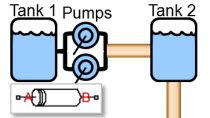Development of a Fuel Cell System Simulator
Shigeki Hasegawa, Kyoto University and Toyota Motor Corporation
The worldwide investment to businesses involving carbon neutrality and decarbonization has become a priority after the Kyoto Protocol in 1997 and the Paris Agreement in 2015 for the prevention of global warming. Hydrogen (H2) energy is considered one of the most promising alternative energy sources to fossil fuels from the viewpoints of storability, portability, and productivity from a variety of energy sources such as solar power and wind power.
The fuel cell (FC) system plays a main role in the enhancement of H2 utilization due to high efficiency compared to conventional internal combustion engines. FC system manufacturers demand the development of a variety of system products for automotive, stationary, railway, marine, and aviation purposes. Despite such an expectation, development of FC system products is conducted by trial and error because the behaviors of the FC system are highly complex. Significant cost and efforts are required for manufacturing the prototypes, calibrating the controllers, and testing the system responses. It is one of the highest barriers for entry to the FC industry and enhancement of H2 utilization. From such backgrounds, implementation of model-based development to the entire FC system development process is demanded by the FC industry. In Model-Based Design, the specification of the system components and controllers can be determined by considering the interactions among them before manufacturing the prototypes.
Though studies of the entire FC system are important, the fuel cell itself has been more intensively investigated. Less research has been done on the FC system including the FC stack; the system components of air, H2, and cooling subsystems; and the FC system controllers. In addition, a system simulator that can estimate the dynamic behavior of the FC system—and can take the interactions among the FC stack, FC system components, and controllers into account with an acceptable computational speed and accuracy—has not been proposed yet. The objective of this study is to develop the integrated system simulator, including the FC system component models and controllers in the entire FC system, which can be utilized as a design platform for the wide range of applications such as automotive, railway, marine, aviation, and stationary power generation purposes. The authors have developed the one-dimensional (1D) FC system model including the 1D physical models of the FC stack in previous research and the FC system components of air, H2, and cooling subsystems. The developed simulator can estimate the dynamic behavior of the entire FC system with acceptable computational speed and accuracy. It is possible to modify the simulator according to the system requirements of the various applications.
Published: 22 Nov 2022




